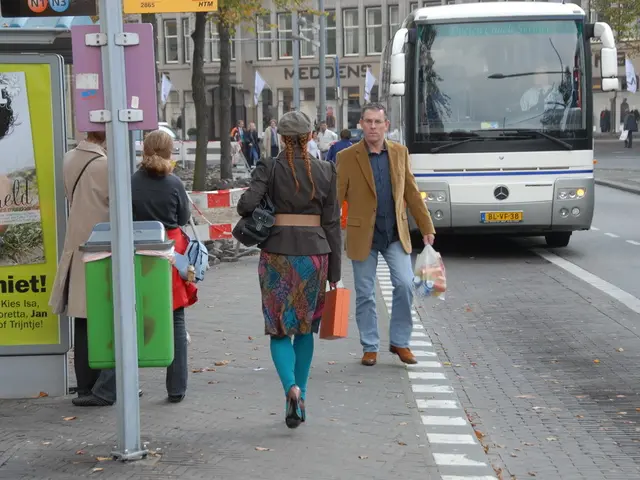Labor action initiated by unions in Cologne
In a major shake-up, workers at Ford's Cologne plant stage an unprecedented strike, causing disruptions in production, development, and administration. The flashpoint? Aiming to thwart planned job cuts and secure employment stability.
The union, IG Metall, had been struggling to reach an agreement with Ford management, who planned to cut around 2,900 jobs—a move that triggered sharp protests. The workers demand a change in course and generous severance packages for those made redundant or outsourced, with dismissals due to operational reasons off the table until 2032.
"The work here has come to a halt," said IG Metall spokesman David Luedtke at Ford Cologne, following the cancellation of early shifts. Scabs, though rare, have managed to sneak in via an emergency service gate, much to the ire of union members.
Ford Works, the Cologne site, has never encountered such turbulence from a trade union before. The last disturbance in the factory came back in 1973 during a non-union-organized strike by Turkish employees. Lacking union support, their protest was unsuccessful.
Nowadays, the 2025 strike has nothing to do with the past labor dispute. In a fiercely contested ballot held in early May, 93.5% of IG Metall members working at Ford voted in favor of striking following management's announcements.
According to Ford Germany's works council chairman, Benjamin Gruschka, the strike has significantly intensified pressure on the employer. If the management refuses to change its position, further strikes would follow, explained Gruschka. The works council emphasized the gravity of the situation, pointing out that the US parent company's cancellation of a patronage declaration raises the specter of possible insolvency.
The IG Metall insists on a financial safety net from the US parent company for employees in case of insolvency. Though insolvency remains theoretical, Ford Germany's debt mountain has seen significant reductions due to a US financial injection. A Ford spokesman expressed optimism, stating they were confident they would come to an agreement in their discussions with social partners.
The workers' struggle received support from SPD politicians like the chairman of the SPD faction in the NRW state parliament, Jochen Ott. Criticizing the Ford management for their handling of employees, Ott recalled his early days as a member of parliament, having been elected in 2010. At that time, a Ford manager dismissed electric cars as "nonsense" in a conversation with him.
Despite the challenges, a glimmer of hope emerged in April as the number of newly registered passenger cars increased by 15.2% compared to the previous year, bolstering Ford's market share to 3.9%. Whether this momentum can help turn the tide remains to be seen.
- The ongoing strike at Ford's Cologne plant, driven by employees aiming to thwart job cuts, is causing significant disruptions in science, technology, engineering, and math (STEM) based industries like manufacturing, aerospace, and finance.
- The union, IG Metall, is advocating for workplace wellness and health and wellness policies, demanding generous severance packages and job security, going as far as making dismissals due to operational reasons off the table until 2032.
- The energy industry could be impacted if Ford's Cologne site, a major manufacturing hub, continues to face such unrest, potentially leading to supply chain disruptions.
- The dispute between IG Metall and Ford management is not only a labor issue but also a matter of policy and legislation, with SPD politicians offering their support to the workers.
- The general news outlets are closely monitoring the situation, covering the strike, the political reactions, and the potential implications for various industries, from manufacturing and aerospace to finance and energy.
- A successful negotiation between IG Metall and Ford management would not only benefit Ford's employees but also contribute to the overall stability of the German and global economy, given Ford's significant presence in the automotive industry.








